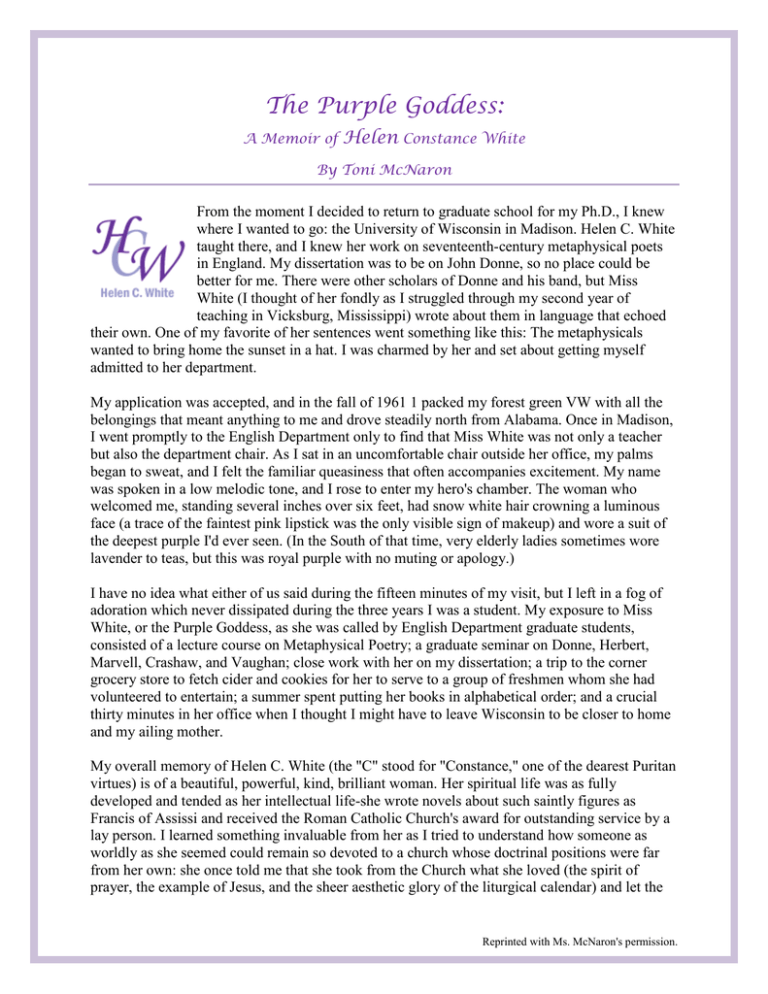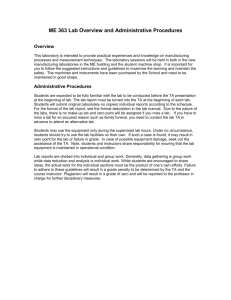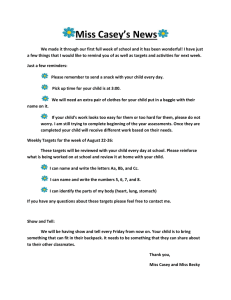The Purple Goddess: Helen
advertisement

The Purple Goddess: A Memoir of Helen Constance White By Toni McNaron From the moment I decided to return to graduate school for my Ph.D., I knew where I wanted to go: the University of Wisconsin in Madison. Helen C. White taught there, and I knew her work on seventeenth-century metaphysical poets in England. My dissertation was to be on John Donne, so no place could be better for me. There were other scholars of Donne and his band, but Miss White (I thought of her fondly as I struggled through my second year of teaching in Vicksburg, Mississippi) wrote about them in language that echoed their own. One of my favorite of her sentences went something like this: The metaphysicals wanted to bring home the sunset in a hat. I was charmed by her and set about getting myself admitted to her department. My application was accepted, and in the fall of 1961 1 packed my forest green VW with all the belongings that meant anything to me and drove steadily north from Alabama. Once in Madison, I went promptly to the English Department only to find that Miss White was not only a teacher but also the department chair. As I sat in an uncomfortable chair outside her office, my palms began to sweat, and I felt the familiar queasiness that often accompanies excitement. My name was spoken in a low melodic tone, and I rose to enter my hero's chamber. The woman who welcomed me, standing several inches over six feet, had snow white hair crowning a luminous face (a trace of the faintest pink lipstick was the only visible sign of makeup) and wore a suit of the deepest purple I'd ever seen. (In the South of that time, very elderly ladies sometimes wore lavender to teas, but this was royal purple with no muting or apology.) I have no idea what either of us said during the fifteen minutes of my visit, but I left in a fog of adoration which never dissipated during the three years I was a student. My exposure to Miss White, or the Purple Goddess, as she was called by English Department graduate students, consisted of a lecture course on Metaphysical Poetry; a graduate seminar on Donne, Herbert, Marvell, Crashaw, and Vaughan; close work with her on my dissertation; a trip to the corner grocery store to fetch cider and cookies for her to serve to a group of freshmen whom she had volunteered to entertain; a summer spent putting her books in alphabetical order; and a crucial thirty minutes in her office when I thought I might have to leave Wisconsin to be closer to home and my ailing mother. My overall memory of Helen C. White (the "C" stood for "Constance," one of the dearest Puritan virtues) is of a beautiful, powerful, kind, brilliant woman. Her spiritual life was as fully developed and tended as her intellectual life-she wrote novels about such saintly figures as Francis of Assissi and received the Roman Catholic Church's award for outstanding service by a lay person. I learned something invaluable from her as I tried to understand how someone as worldly as she seemed could remain so devoted to a church whose doctrinal positions were far from her own: she once told me that she took from the Church what she loved (the spirit of prayer, the example of Jesus, and the sheer aesthetic glory of the liturgical calendar) and let the Reprinted with Ms. McNaron's permission. The Purple Goddess • 2 dogma go without much fretting. This ability to save babies from bathwaters has become a much pursued goal in my middle years. Her lecture course left me breathless from one to two o'clock every Tuesday and Thursday afternoon. Miss White floated into the room (she could actually do that with all her height and solidness), opened her file folder, and began to talk about one of the seventeenth-century men who obviously commanded her heart as well as her mind. Weaving together lines from their poems, facts and anecdotes about their lives, and a stunning critical insight, she seemed not to breathe until the class was over. Then she gently closed her file folder, smiled benignly, and strode out as if she knew she'd just given a stellar performance. I came to see John Donne as someone utterly focused on his own experience as the basis for all his understanding, George Herbert as a deeply religious man who worried constantly about usurping God's prerogative through creating his lyrics even when they glorified God, Richard Crashaw as a zealot who carried his adoration of Christ and St. Teresa to verbal extremes but who never meant ill, Andrew Marvell as a younger generation member who felt a split between his mind and his heart that would only have bemused his forebears, and Henry Vaughan as a truly mystic poet with a command of metaphor seldom equaled in English. Even now, twenty years later when I no longer read Donne or Marvell because of their misogyny, I see Miss White standing before me on the slightly raised podium, telling me why each writer deserved my utter attention, reading me lines of poetry so that I would never forget them. It took very little time to determine why Miss White got her nickname. All her clothing was either purple or a color that went easily with purple: flowered blouses in magentas, ochres, pale greens; entire dresses of soft lavender wool set off by a paisleyed scarf of red violets and navies, luscious shades of purple skirt suits worn with spotless white blouses, always with Peter Pan collars. I once nerved myself to ask her why she never deviated from her color and heard her reply: "Well, my dear, it's so much easier just to get out of bed and take something out of the closet knowing it will match." While I can certainly sympathize with her impulse, my question really was not why the same color, but rather why purple. My own theory ran to two connotations: it's the color associated with women-loving-women, and it's the color used by liturgical churches and monarchical governments to denote royalty. "Goddess" had been attached because of her extreme height and stature-she resembled a lavender Amazon, gliding from office to class to the ladies' room nearby. Once I remember going into that ladies' room and spotting Miss White's unmistakable black brogans in the stall next to me. I held my breath, excited about being so intimate. Rather than speaking through the partition (which would have been invasive and, besides, would have let her know that I was making a careful study of her footwear) or even hurrying with my own activity so that I could just happen to be washing my hands when she was, I sat very still and listened while she let herself out of her cubicle, ran the water to wash her hands, pulled out and used a paper towel, perhaps touched her hair at the edges or arranged her clothing before meeting the public, pulled open the eternally squeaking door, and vanished. Yes, I had a crush on Helen C. White. She was the most exotic woman I'd ever known outside of the Silver Screen. To come into such close and frequent contact with one's hero usually isn't recommended, since our need for such giants demands a distance. But I wanted ever more The Purple Goddess • 3 personal contact and went to lengths to get it. For instance, Miss White always walked up Bascom Hill, as we called that very long, very steep slope from the nearest thoroughfare up onto the campus. At the top sat Beacon Hall where English and the other languages held forth. After weeks of trial and error, I determined almost to the minute when she began her ascent to her office. As soon as possible thereafter, I arrived at the beginning of the sidewalk as she did, and we trudged up together. I still can hear her even breathing as she took the incline slowly but deliberately, invariably pausing midway to tell me about the architecture of the Law School or to show me the periwinkles as they progressed from glossy-leafed shoots to a luxurious ground cover full of tiny blue-violet blooms. I treasured those walks even when other students or her colleagues interrupted my communion to exchange friendly greetings or a shy nod. Occasionally Miss White would give in to my repeated offers to carry something of hers up the hill-two or three reference books from her library at home, a bag with her brogans for wear inside the building. When it snowed, she wore short booties with the merest hint of a heel. Once or twice I even carried her overnight bag, brought to work because she was to go directly to the airport and fly away to speak at some conference or to some major university where she would consult with others of her rank and station. A group especially dear to the Purple Goddess was her own doctoral candidates. She protected us from bureaucratic harm and other forms of academic harassment. One summer she found work for the not-as-bright husband of a brilliant woman working on the influence of things medieval on metaphysical poetry. Another summer she helped me stay longer in Madison than my funds would allow by hiring me to alphabetize her library. Every morning I arrived promptly at nine at her apartment near campus. It consisted of a smallish living room, a dining area used by her as a library/ work room, a tiny kitchen in which she ate her breakfasts, a tinier bathroom, and her rather large bedroom with its single bed always unmade. Some days I felt bold enough to make up her bed, wash her breakfast dishes, bring in fresh flowers for the table-I fantasized being Helen's partner, taking care of the one who took care of so many of us. When I did these domestic things, I always got a little scribbled note in her miniature handwriting. I kept these billets-doux for years, reading over their few words of gratitude and warmth: "you are so sweet to tidy up"; "I prefer my bed made but am just too lazy to do it"; "my dear, you are too kind." Other mornings she left out crackers and a clean tea cup with a note to fix myself midmorning tea; once she prepared, and lovingly covered in waxed paper, a light lunch of cheese slices and rounds of caraway bread. Feeling very special indeed, I savored every crumb. When all the books (literally hundreds) were in perfect alphabetical order within specified categories such as "Medieval Romances," "Pre-Socratic Philosophers," "Donne Criticism," I could no longer prolong my stay in my hero's quarters. On my last day I cleaned the entire apartment. For her part, Miss White had left the last of a series of checks for more than my hours ever justified. When I protested early in the project, she wrote feeble excuses about her misreading of my figures or about making the next check smaller to even things out. After it became clear to me that she was not ever going to pay me what I had supposedly earned, I let it sink in that she had probably invented the entire project just to have a way to give me money. My suspicion was confirmed when I received a late night call two days after I'd finished my work. It was the Purple Goddess saying, "My dear, I'm so sorry to disturb you, but could you come over in the morning and find some books for me? Now that you have my library in such wonderful order, I'm terribly afraid I can't locate what I need." In a flash I knew that the whole The Purple Goddess • 4 activity had been for my benefit not hers, that she would probably have to mess up her collections soon if she was to continue finding them useful. One of her most generous acts towards an advisee came in the winter of my first year. A bright young man from Boston was working on George Herbert and teaching freshman English. Well versed in Latin, he was a treat for Miss White who was obviously fond of him. He was my friend as well, and I thought him one of the kindest people I'd ever known. I assumed he was gay from certain details of his own personality and demeanor and from some clues he threw out for the taking. None of us who were lesbian or gay were talking about that yet, but I suspect we all had our private hunches. Late one night in January I got a call from my best friend who was also this man's close friend: the Latinist from Boston had been booked by campus police for making overtures to a young man in a bathroom. My friend and I talked a long time, cloaking over fear and sadness in anger about "cops who hate queers." By the next day at school many people seemed to have heard about the arrest; we clustered in the halls to speculate on how long it would be before our classmate would be expelled. At the end of that very long day, my friend and I had coffee with the Boston scholar who'd acted foolishly to say the least. What he told us made us cry. It seems that Miss White had gone down to the police station, taken him out of jail under her recognizance, paid for a cab to see him safely to his apartment until the next day when she would see him in her office. Between the early morning hour when she left our friend and eleven the next morning, Helen C. White had figured everything out. She had been unable to prevent the police from filing a full report with university officials and knew her student would have to leave Wisconsin. When she saw him, she gave him her assurance that he could write a letter to the English Department explaining that he needed to return home immediately for personal reasons. She also gave him a glowing letter which must have cost what few hours of sleep remained to her. Coming from one of the most respected scholars in the field, this letter allowed our careless friend to enter graduate school in the Boston area, complete his work as a student, and carry on with his life. He told us that she'd never made him feel dirty or freakish, that she'd been the soul of kindness, expressing concern that someone with so fine a mind should be able to teach and write within an academic setting. Her only reference to his actions was to say "You know, one can never put much faith in the very young-they bolt like rabbits and leave one hanging . . . . I'm sure you'll be more careful in the future." That sentence haunted me, since it seemed related to the endless speculations we graduate students made about why Miss White was "Miss." The more conventional among us argued that her deep participation in Catholicism encouraged her to be a kind of secular nun, working for the greater glory of humanity without regard to her own concerns. The more romantic believed she had probably had a "great love" in her youth and when held jilted her, she had shut off her sexual self and sublimated that energy into writing and teaching. Those of us who stood outside heterosexuality had a quite different, though equally romantic, version of things. We were convinced that if there had been any "great love," it had certainly been a "she." Most of us settled for one of the already existent stories, namely that Ruth Wallerstein (another seventeenth-century scholar who had worked at Wisconsin and helped Miss White edit the text in metaphysical poetry) and Miss White had been extremely close, maybe even lovers. Wallerstein's sports car had gone off a Swiss mountain pass several years before I'd arrived at Wisconsin, so the flames of our story were fed with a tragic death scene. When I heard my tormented friend quoting Miss White about the livery young," I for one began constructing a private fantasy. I came to believe The Purple Goddess • 5 that sometime in her far past my hero had invested herself too heavily in some female graduate student who had then left her for career or husband of both. This story greatly honored me, since I fancied that Miss White felt some special bond with me, and certainly I would never forsake her if she would only speak the word to draw closer. That word never came, but what she did say saved me on one crucial occasion. During the second year of my studies, just as I was formulating the topic for my dissertation, my mother became seriously ill. Under and between the lines of her letters, I heard her wanting me closer. More overtly, my sister stated that Mamie's health was worsening, that Mamie missed me, that my absence was increasingly hard on Mamie's nerves. Bowing to a guilt I already felt for leaving home in the first place, I wrote my mother that I would apply to graduate schools closer to Alabama so we could see each other more often. That process involved getting letters of recommendation from my professors at Wisconsin. Of course I asked Miss White; as my advisor, she was in a particularly strong position to write well about my stay in the Midwest. One day I received a note from the departmental secretary asking me to make an appointment with Miss White at my earliest convenience. I did so instantly, since I welcomed any opportunity to spend private moments with the Goddess. The minute I stepped into her inner office, I knew Miss White was serious about something. After telling me she would of course be glad to write a fine letter, she sat quietly, pensively, indeed I even thought, sadly. Not daring to disturb her, I waited uncomfortably for what was to come next. Finally, she looked me full in the face and began telling me an autobiographical story. It seems she was from Boston, one of four children (two girls, two boys), none of whom had ever married. She described her mother as the matriarch of the family and her father as somewhat shadowy. As she spoke, I felt a certain identification, since my own parents were so like hers. Gathering herself up in her chair, she came to the climax of her story: Well, my dear, there came a day when my father called me into his room and said to me, 'Helen, leave Boston now or you'll never get away and you'll end up like me.' I understood him to mean that all of us were so involved with our mother that, without a physical break, we would simply submerge ourselves. I left that fall and have thanked my father ever since. I could not have done what I have without his words ... Toni [my heart leapt inside me, for she'd never called me by my name before-Miss McNaron or my dear had served], I've told you this personal story because I fear for you now. You love your mother very much and if you say yes now, you may never say no. But of course, I'll do whatever you ask about your future ... She never said another word about that visit. In fact, I had to thank her and leave her office without her saying anything more at all. She was staring out her window, which overlooked Bascom Hill and the city of Madison below. The effort of sharing her own life had obviously tired her, even at this great remove from the actual occurrence. I think her silent response to her own words made as much impression on me as the words themselves. I phoned home that evening to tell my mother and sister that I would of course come closer if necessary but that I did like Wisconsin. My mother rose to the occasion, told me her health was improving and that she knew I would get far better instruction there than at the University of Texas where I had been tentatively accepted. I made a feeble protest that I didn't mind returning, which in turn let her insist that I stay. We both saved some face. I hung up in tears of relief and genuine sadness that The Purple Goddess • 6 my life was taking me further and further away from a woman whose love I both wanted and feared. As I sat on the bed in my slum apartment looking at the decaled refrigerator, Miss White came back into my mind, sitting in her office looking wistfully out her window. During my last year at Wisconsin, I was freed from teaching in order to finish my dissertation. Miss White had told me at the outset of that project that she intended to hurry me along: "You need to finish and go be an adult somewhere." As I gave her my chapters, I at times resented the sparsity of comments and overvalued what marginalia I did get. When I said in my opening pages that language could be used to mask as well as reveal-something I'd learned from the cradle-she wrote in light pencil "Very well put and wise too." I can see that phrase twenty years later as if she'd written it last week. I also can still hear her tell us as she explicated Vaughan's more esoteric poems, "Do not dabble in alchemy; it's far too powerful for that. If you plan to find out about it, be prepared to go deeply, as Vaughan himself did." And I can still remember my thrill when Helen White asked me to accompany her to the local grocery one late afternoon as we both were leaving school. She had agreed for the umpteenth time to entertain a small group of honors freshmen at her apartment. Every year, this internationally famous scholar chatted with eighteen-year-olds while serving them cider and cookies. They were due in a few hours and she wasn't ready. Of course I assented and we hurried down Bascom Hill to her place. There we picked up a large string bag she'd bought in Italy on her last visit to the Vatican. Once at the grocery, she set about with great efficiency and in no time she had three boxes of mixed cookies and two gallons of cider paid for and ready for transport. She put the bottles into the string bag first, then the more delicate boxes of cookies, and turned to face me directly. "Toni, my dear, can you take one of the hoop handles and I'll take the other?" So I took the leftmost handle in my right hand, while the Purple Goddess took the other in her left, and we walked up University Avenue the five blocks to her apartment. I felt supremely happy to be so fully involved with her, even if in so mundane an activity. We said very little, but were drawn together as the evening closed around us. Once at her building, she took her bag in her own hands, smiled warmly, murmured a good night, and slipped inside. Once I left Wisconsin, I heard from Helen White (whom I could never stop calling "Miss White") occasionally and wrote her regularly. I knew that the English Department had convinced her to serve a second term as Chair because they needed her to travel across the Atlantic to recruit international scholars who would add luster to their ranks. From other people I heard that her health wasn't good, that although she had been quite successful in finding the needed scholars, the numerous trans-Atlantic flights had worn her down. Then I heard she'd had a stroke and couldn't be clearly under stood from the classroom platform. I wrote her what was to be my last card, but failed to hear from her even at Christmas. Then I got word that she had died and that the University was going to name a new undergraduate library after her. For several years I resented the institution. Once that feeling receded and my own grief filled its place, I realized that I'd used anger to avoid my pain. Miss White's death was a shock to me-my own mother had died during the writing of my dissertation, so I'd put off mourning. Maybe my sense of utter loss over my teacher had some of that earlier event mixed in. In any case, I felt The Purple Goddess • 7 motherless again-this time it was my intellectual mother, my model for how to treat students and how to approach a poem by someone you love and admire. I have visited the Helen C. White Library in Madison but can find no hint of our Purple Goddess there. It is nonetheless appropriate to affix her name to a house of books, since she loved them so-both as subjects in themselves and as sources of wisdom and pleasure. I have gone to the place where her apartment stood only to find it flattened to make way for the inevitable parking lot. Framed and hanging in my study is a photograph of Helen White which was given to me by a book salesman who also loved her. Her customary purpleness turned black and white, she sits in her own library, looking pensive and kind, infinitely knowing and good. She is in that photo and in her own writings; she will live in my heart and memory always.







